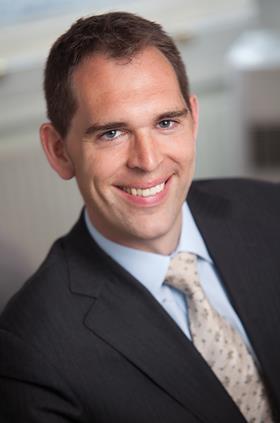As a recent survey reveals that the increasing complexity of compliance is a top concern for more than three-quarters of lawyers, Lucy Trevelyan talks to William Robins, director of compliance and operations at Keystone Law, about the challenges he faces in his role
It’s simply not possible to practise law in the modern age without a sophisticated compliance offering, says William Robins, director of compliance and operations at Keystone Law. “Compliance needs to be there to build systems that meet the non-negotiable requirements of the regulator, parliament, insurers and clients. Compliance needs to be there when lawyers get stuck and to supervise the work the firm does.”

Indeed, he says, when moving firms, lawyers should make it a top priority to investigate the efficacy of the new firm’s compliance team to ensure that it can provide the support they need. “Lawyers can’t possibly know all the rules that govern the practice of law and will find themselves at some point in their career in a challenging situation. Before joining any firm, they need to ask themselves whether they are happy with the systems in their new firm through which their clients will be serviced and who will be there for them when they come up against an ethical or regulatory problem.”
Way before the coronavirus (COVID-19) pandemic forced a sea-change in working practices which saw flexible and remote working become the norm, Keystone Law had introduced an innovative IT platform which allows its lawyers to work from any location, whether at home, hot-desking in the firm’s offices or renting offices of their own in a location convenient to them.
The operational freedom lawyers at Keystone enjoy is not at the expense of compliance though, he says. Far from it. “Indeed, it’s because lawyers have so much freedom and because no lawyer can be above compliance and regulation, that explains why Keystone lawyers work within high risk and regulatory areas which is very closely controlled.”
Compliance is sewn into everything the firm does, and it is a standing item on the firm’s weekly operational board meetings and the monthly PLC board meetings of its parent company, on which he sits as company secretary, he says.
Senior management buy-in to the importance of compliance is essential and needs to start early, he says. “Compliance can’t be a bolt on, it must be one of the central tenets of a firm and the director or partner in charge of compliance needs to be an integral part. Any firm which employs a compliance director to deal with compliance on an arm’s length
basis, reporting to the board and not having a strong and equal voice on it, is asking for trouble.”
Little and often is his approach to communicating compliance issues to the rest of the firm, he says. “Compliance issues need to be broken down and expressed to lawyers in a way they will understand. They don’t want to know what the rules are (though some element of this will be required in any explanation). Instead, they want to know what they need to do to comply with the rules and when they need to be picking up the phone to get help from the compliance function.”
When it comes to dealing with the lawyers in the business, it is vital to see things from their point of view, he says. “You have to be long on carrots and short on sticks and, above all, you need to accessible any time for anything. Telling people off is not going to help.”
Over the years, he has built an extremely good team of subject experts and helped them integrate into the business and take ownership of their respective areas, he says. “As a leader, delegation and trust in one’s colleagues is paramount. The lines of reporting should ensure an information flow back to you, so far as you need. It does not pay to get too involved in the detail. By contrast, it does pay to support your team and any person to whom work is delegated have a right to support from their line managers. There will, of course, be matters that require the director’s personal attention. In my experience, it’s always clear what these are.”
Without question, he says, his background as a corporate lawyer in the City is invaluable in his current role: he qualified as a solicitor in 2003 with City firm, Berwin Leighton Paisner before taking up his current role at Keystone Law in 2009.

“A legal background is not necessary to run a compliance function, but it’s a big advantage. It provides a wider understanding of the framework within which corporate vehicles act and it provides an appreciation as to what it is like for lawyers at the coal face, where compliance has to be deployed by colleagues who already have their hands full looking after clients.”
He admits that had he known where he would end up, he would have taken a very different route to get there. “I never intended to spend so much time dealing with compliance. The fact that I have is down to two factors: first, that there is so much compliance involved in the delivery of legal services; second, it turns out I have something of an aptitude for compliance.”
There is no such thing as an average day in his role, he says. “Typically, the days are long and the work is stressful. It’s definitely not all good news. But it’s a vital role and the satisfaction comes from helping colleagues practise safely and look after their clients. Days are always varied, partly due to the fact that much of what a compliance officer must do is reactive. Problems happen during the practice of law and create risk. The compliance team are there to mitigate that risk and protect both the business and its lawyers.”
On the proactive front, he adds, the role includes setting and updating the firm’s policies on everything the firm does and ensures all those in the business are adequately trained on the policies and rules, as well as supervising the work that the firm does from the regulatory perspective. “I run a team of eight compliance professionals. My role, and that of the team, is to provide a safe, efficient environment in which our lawyers can practise. We are responsible for the entire life cycle of clients, matters and colleagues through our business.”
Data security is one of the most pressing concerns that occupies his time, he says, with never a day going by without some work taking place looking at the issue. As a result, he spends a large part of his day working with the firm’s director of technology and innovation, Maurice Tunney, William says, “striving to keep the firm, its lawyers and its clients safe in a world that is a pretty dangerous place when it comes to data protection… As compliance and IT directors throughout law know, data never sleeps and neither do bad actors who constantly try to access it.” “A law firm’s clients entrust their chosen firm with large amount of confidential data and the firm is professionally, legally and logistically responsible for keeping that data safe. If that data were to be exfiltrated or altered, then the consequences for the firm could be catastrophic.”
The compliance role is a vital pillar in supporting the firm’s legal practice and by necessity, stretches into everything the firm does, he says. “It frequently overlaps with accounts, as the application of the solicitors’ accounts rules and the money laundering rules (especially on source of funds) mean that the compliance function plays an important supporting role in ratifying a great many client account transactions. The firm’s IT systems need to be user friendly so they enable lawyers to practise their art in today’s competitive environment, but they must also be secure by design. These are diametrically opposed goals and finding a suitable midpoint between these is a constant challenge.”
For better or worse, the regulatory system we have makes the compliance officer for legal practice (COLP) personally responsible for all actions at the firm, he says. “If something goes wrong at the firm, then it’s the COLP who must investigate it, put it right and face any sanction for the failure. It’s an unenviable task and one with few safe spaces. The rules are purposive, so almost anything can be a breach and sanctions for breach are somewhat unpredictable.”
The Solicitors Regulation Authority (SRA) warning notice on strategic lawsuits against public participation (SLAPPs) is a case in point and a reason why every firm needs to invest in its compliance team, he says. “In what may appear to be a note aimed only at lawyers involved in gagging orders, the SRA raises the bar for what the SRA expects of all litigators.
“While I am no specialist, I have had some meaningful experience of litigation and I understand client demands. Litigators often have clients who come to them who seek a remedy for some wrong they perceive to have been done to them. They want their lawyer to demand the remedy to which they believe they are entitled from the other side and in the event of not acceding to that demand, they will want to resort to using the courts to compel the other side to toe the line.”
He warns, however, that the result of this new warning notice is to raise the bar on the extent to which lawyers have a professional duty to refuse to accept certain instructions from clients wanting such access and ready to pay for it. “It introduces the professional offence of being reckless as to the prospects of a case or line of argument. If it later turns out that the line of argument was untenable, then it becomes professional misconduct to have raised it.”
He adds: “One can understand this where it is possible to ascertain the legal merits at the time of composing the relevant argument. But what of the situation where a lawyer did not know and perhaps could not have known the full merits of an argument? What of the situation where to get to the bottom of a case, some material further work, for example, an expensive expert’s report, is required and the client does not want to pay for that and prefers to chance his luck in putting the risk on the other side to settle?”
As any compliance officer would say, the takeaway from this is: if in doubt pick up the phone, he says. “It also reinforces the point made that compliance is central to the practice of law. Partners looking to move should want to find out how the firm deals with compliance matters before signing on the dotted line!”
















